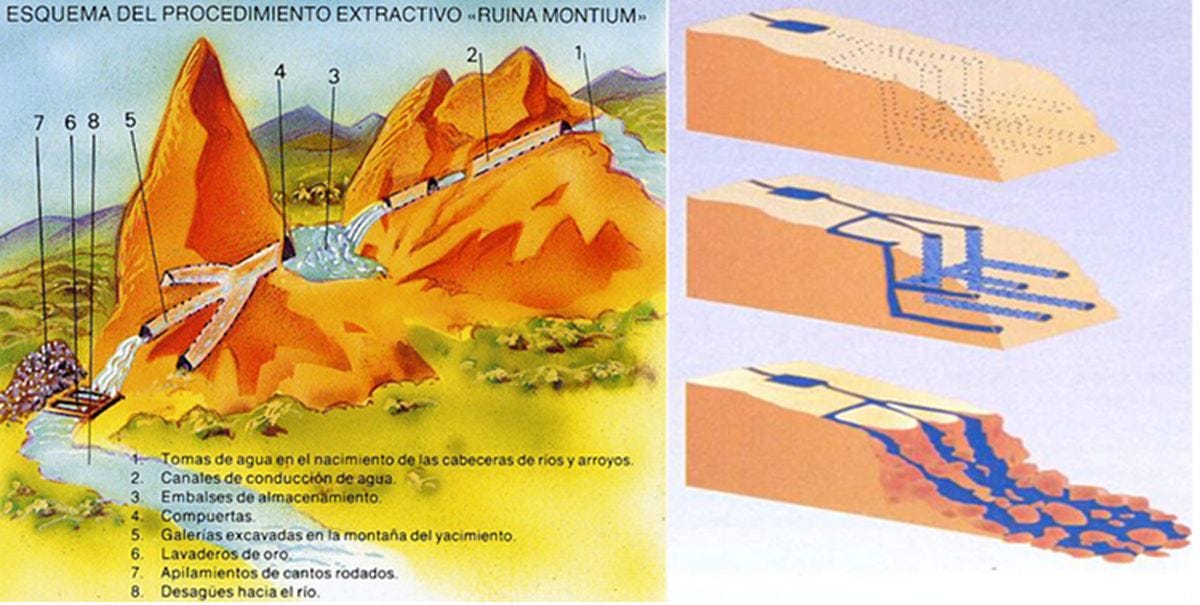The Distilled Download - June Edition
Mind-blowing Roman Mining, Magic 🍄, AI For Science, and Amazing Productivity Tool
Greetings, fellow science lovers! First, thank you for subscribing to this little project. I hope to use it as a fun way to interact more directly with you guys, to share some of the things that I find fascinating that I don't have time to make individual videos about, and to engage in some deeper thinking that doesn't lend itself well to short-attention-span videos. This particular format is a version of my ongoing newsletter, which is most often sent on Fridays, with a format inspired by Tim Ferriss’ 5-bullet Friday (one of the newsletters I am most likely to open). It’s me sharing some fun papers, videos, articles, gadgets, factoids, or anything else that struck my fancy recently, and I think you might enjoy. It will generally be at least 50% science-related, because… I’m a nerd like that 🧑🔬.
And now, on to the goods.
⛰️ The ancient Romans demolished entire mountains to extract gold
So apparently the ancient Romans looked at entire mountains full of gold in northern Spain and thought, "You know what? Let's just destroy those." At Las Médulas, Roman engineers dug intricate tunnel networks to weaken the mountains, then built massive water reservoirs connected to rivers kilometers away. Their plan? Release torrents of water at crazy high speeds to basically hydraulic-pressure the mountains into collapsing, then wash out all the gold from the rubble. This absolutely wild project spanned over a century, relocating approximately 500 million cubic meters of dirt and rock (equivalent to moving Mount Rushmore 125 times), and completely transformed the landscape. It's pretty incredible what humans can accomplish when there's shiny metal involved. Check out this video that includes some great visuals!
🍄 Magic Mushrooms for Depression
This past Wednesday, New Zealand approved the use of psilocybin (the active compound in magic mushrooms) for medical use. It’s still not an “approved drug,” but experienced clinicians are now allowed to prescribe it to patients with treatment-resistant depression.
I’ve spoken about this before, but right now, psilocybin is one of the most promising substances we know of for treating depression. A meta-analysis published last year analyzed 12 studies and found that it was highly effective in improving (or eliminating) treatment-resistant depression after just one or two doses, with the effects often persisting at 12-month follow-ups!
One important thing to note: psilocybin is less of a “magic anti-depression pill” and more of a “pill that lets you do 12 months of therapy all at once.” But this mostly works when used in the context of therapy and self-reflection, rather than as a recreational drug to see some cool visuals.
🤖 AI for Science
Researchers at Harvard and MIT developed an AI system called “otto-SR,” capable of automatically performing systematic reviews of scientific research according to the gold standard Cochrane process. It was able to produce results in just two days that would normally take humans over a year to complete, showing a 93.1% accuracy for data extraction (compared to 79.7% for humans) as well as identifying studies that humans had missed.
This, to me, is one of the most exciting applications of AI. Rather than replacing human thinking, this approach instead leverages the fundamental advantages of computer systems in searching through and processing vast amounts of data and running numerical calculations on them. As someone who spends a large percentage of his time conducting personal literature reviews on obscure topics, I can’t wait to get access to this!
🗣️ Tool that’s been saving me time
I can type at 100 WPM… but I can speak at over 400. These days, if I’m typing more than a handful of words, I press a quick hotkey on my keyboard and just dictate all the text using a tool called Wispr Flow (I like using left option+shift as my hotkey). It takes barely any time to process, is great at using the right punctuation, and even gets most custom words and names correct (for the ones that it doesn't get right, if you go and correct it, it will update its own dictionary so that it gets it right the next time). They also recently released an iPhone app that lets you install a new keyboard on your phone with a button to enable this same dictation (which is soo much better than Siri). There’s a free version that lets you type up to 2000 words per week, and then a paid one with Unlimited for $12/month. (Note: this is NOT sponsored. I pay for it! I did just join their affiliate program though so if you use this link to sign up it does help me a wee bit 😊 )
Content Updates
Lately, I've been publishing a lot of videos in a series I call "Tingles and Touch" where I examine some of the neuroscience behind why different types of touch impact our brains differently and how different conditions like ADHD or ASD impact how we enjoy (or hate) said types of touch. This was an outgrowth from the series I had planned to do on the science behind oxytocin, but y'all keep asking questions and I went down a fun little research rabbit hole. I've got a few more videos in this series planned, but next up, I'm going to shift to doing a series on sleep hacks. Then one that I've been planning for a long time, which will be science in the kitchen. If you have any burning questions on any of these topics that you'd like to see me cover, just respond to this email!




